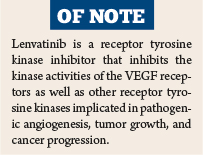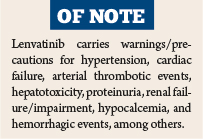In the Clinic provides overviews of novel oncology agents, addressing indications, mechanisms, administration recommendations, safety profiles, and other essential information needed for the appropriate clinical use of these drugs.
On May 13, 2016, lenvatinib (Lenvima) was approved for use in combination with everolimus (Afinitor) in the treatment of advanced renal cell carcinoma following one prior antiangiogenic therapy.1,2Supporting Efficacy Data
The current approval was based on a randomized phase II study in which 153 patients with advanced or metastatic renal cell carcinoma who previously received antiangiogenic therapy were randomized to receive lenvatinib at 18 mg plus everolimus at 5 mg (n = 51), lenvatinib at 24 mg (n = 52), or everolimus at 10 mg (n = 50) once daily.2,3 The major efficacy outcome measure was investigator-assessed progression-free survival evaluated according to RECIST (Response Evaluation Criteria in Solid Tumors) v1.1.
Among the 101 patients in the lenvatinib plus everolimus group and everolimus monotherapy group, 72% were male, median age was 60 years (31% > 65 years), 96% were white; metastases were present in 95%, and unresectable advanced disease was present in 5%. All patients had Eastern Cooperative Oncology Group performance status of 0 (54%) or 1 (46%), and Memorial Sloan Kettering Cancer Center (MSK) risk categories were favorable, intermediate, and poor in 24%, 37%, and 39% of patients in the lenvatinib plus everolimus group and 24%, 38%, and 38% of patients in the everolimus group, respectively.

Median progression-free survival was 14.6 months (95% confidence interval [CI] = 5.9–20.1 months) in the lenvatinib plus everolimus group vs 5.5 months (95% CI = 3.5–7.1 months) in the everolimus group, with a hazard ratio (HR) of 0.37 (95% CI = 0.22–0.62). The treatment effect was supported by a retrospective independent radiographic review, which yielded a hazard ratio of 0.43 (95% CI = 0.24–0.75). The hazard ratio for a post-hoc, updated comparison of overall survival between the lenvatinib plus everolimus vs everolimus group was 0.67 (95% CI = 0.42–1.08). Comparison between the lenvatinib and everolimus monotherapy groups supported the activity of lenvatinib. The combination showed numerically superior progression-free survival, objective response rate, and overall survival vs lenvatinib monotherapy. There was no prespecified plan for multiple comparisons.
How It Works
Lenvatinib is a receptor tyrosine kinase inhibitor that inhibits the kinase activities of the vascular epithelial growth factor (VEGF) receptors VEGFR1 (FLT1), VEGFR2 (KDR), and VEGFR3 (FLT4). Lenvatinib also inhibits other receptor tyrosine kinases implicated in pathogenic angiogenesis, tumor growth, and cancer progression in addition to their normal cellular functions, including the fibroblast growth factor (FGF) receptors FGFR1, 2, 3, and 4; platelet-derived growth factor receptor alpha (PDGFRα); KIT; and RET. The combination of lenvatinib and everolimus exhibited antiangiogenic and antitumor activity, as demonstrated by decreased human endothelial cell proliferation, tube formation, and VEGF signaling in vitro and tumor volume in mouse xenograft models of human renal cell carcinoma greater than that observed with each drug alone.
How It Is Used
The recommended dose of lenvatinib is 18 mg in combination with 5 mg of everolimus orally once daily until disease progression or unacceptable toxicity. The recommended starting dose of lenvatinib is 10 mg in patients with severe renal or hepatic impairment.
Lenvatinib should be held for grade 3 hypertension, cardiac dysfunction, QTc prolongation (> 500 ms), nausea, vomiting, diarrhea, and hemorrhage; held or discontinued for grade 3 or 4 hepatotoxicity, grade 3 or 4 renal failure or impairment, and any grade reversible posterior leukoencephalopathy syndrome; and discontinued for grade 3 or 4 hepatic failure, grade 4 hypertension, cardiac dysfunction, vomiting, diarrhea, hemorrhage, any grade arterial thrombotic event, nephrotic syndrome, any grade gastrointestinal perforation, and grade 3 or 4 fistula.
Combination Treatment for Advanced Kidney Cancer
- Lenvatinib (Lenvima) was approved for use in combination with everolimus in the treatment of advanced renal cell carcinoma following one prior antiangiogenic therapy.
- The recommended dose of lenvatinib is 18 mg in combination with 5 mg of everolimus orally once daily.
For first, second, and third occurrences of persistent and intolerable grade 2 or grade 3 adverse reactions or grade 4 laboratory abnormalities, treatment should be interrupted until resolution to grade 0 or 1 or baseline. Then treatment can be resumed, successively, at 14, 10, and 8 mg daily.
Everolimus labeling must be reviewed for dose modifications. For toxicities thought to be related to everolimus alone, the drug should be discontinued, interrupted, or used on alternate days. For toxicities considered to be related to both lenvatinib and everolimus, the lenvatinib dose should be reduced first.
Safety Profile
The most common adverse events of any grade in the lenvatinib plus everolimus group were diarrhea (81% vs 34% in the everolimus group), fatigue (73% vs 40%), arthralgia/myalgia (55% vs 32%), decreased appetite (53% vs 18%), vomiting (48% vs 12%), nausea (45% vs 16%), stomatitis/oral inflammation (44% vs 50%), hypertension (42% vs 10%), and peripheral edema (42% vs 20%). The most common grade 3 or 4 adverse events were diarrhea (19% vs 2%), fatigue (18% vs 2%), hypertension (13% vs 2%), and renal failure (10% vs 2%). The most common grade 3 or 4 lab abnormalities were hypertriglyceridemia (18% vs 18%) and increased lipase (13% vs 12%).

The most common serious adverse events in the combination group were renal failure (11%), dehydration (10%), anemia (6%), thrombocytopenia (5%), diarrhea (5%), vomiting (5%), and dyspnea (5%). Adverse events led to dose reduction or interruption in 89% of the combination group vs 54% of the everolimus group, with the most common in the combination group being diarrhea (21%), fatigue (8%), thrombocytopenia (6%), vomiting (6%), nausea (5%), and proteinuria (5%). Adverse events led to treatment discontinuation in 29% vs 12%.
Lenvatinib carries warnings/precautions for hypertension, cardiac failure, arterial thrombotic events, hepatotoxicity, proteinuria, diarrhea, renal failure and impairment, gastrointestinal perforation and fistula formation, QT interval prolongation, hypocalcemia, reversible posterior leukoencephalopathy syndrome, hemorrhagic events, impairment of thyroid-stimulating hormone (TSH) suppression/thyroid dysfunction, and embryofetal toxicity. Patients should be monitored for blood pressure, clinical signs/symptoms of cardiac decompensation, liver function, proteinuria, electrolyte imbalance, blood calcium levels, and TSH. ■
References
1. U.S. Food and Drug Administration: Lenvatinib in combination with everolimus. Available at http://www.fda.gov/Drugs/InformationOnDrugs/ApprovedDrugs/ucm501070.htm. Accessed May 24, 2016.
2. Lenvatinib (Lenvima) capsules for oral use prescribing information. Esai, Inc, May 2016. Available at http://www.accessdata.fda.gov/drugsatfda_docs/label/2016/206947s003lbl.pdf. Accessed May 24, 2016.
3. Motzer RJ, Hutson TE, Glen H, et al: Lenvatinib, everolimus, and the combination in patients with metastatic renal cell carcinoma: A randomised, phase 2, open-label, multicentre trial. Lancet Oncol 16:1473-1482, 2015.

